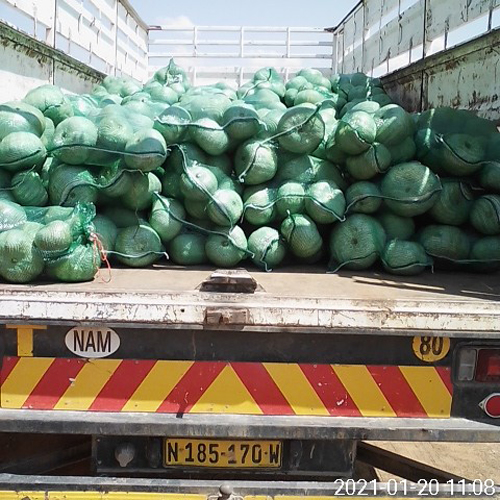Weekend farming is not a new concept in Namibia as many people regularly supplement their monthly income with some kind of part-time agricultural activity. However, a financial planner at a local bank, Aubrey Hardine, has a new inspiration, partly brought about by the Covid-19 pandemic, to evolve his small-scale farm into a full-fledged commercial operation.
The financial planner, who is gradually swapping the boardroom for the tractor, currently has some 0.3 hectares of land under pumpkin cultivation, which he intends to expand to one hectare by August this year. This, he said, is his bid to contribute in the reduction of the country’s over reliance on fruit and vegetable imports. These imports, mostly from South Africa, in 2019 totalled an astronomical US$59.56 million or over N$897 million at today’s exchange rates.
“Covid-19 showed us the fragility of our food security but I see the pandemic as an opportunity for Namibia to utilise farmland productively to increase our food security. If we as Namibians support our local farmers, then that is how we can grow the agricultural industry to become food secure. If we all buy local fresh produce, imagine what that will do to our GDP,” Hardine stated.
The pandemic’s impact on job security and food import uncertainty ignited Hardine’s dream to go full steam into a commercial farming operation. “I want to make farming a profitable venture. This means going commercial and that entails going far beyond just planting seeds and adding water,” said Hardine.
As a full-time financial planner, Hardine had to rope in expert farming advice, which he admits was not an easy feat. After searching high and low, he eventually secured valuable mentorship and recently harvested and marketed five tons of pumpkins, for which he secured supply to local retailers towards the end of last year.
“My wife, Chantelle, and I managed to secure some land in February 2020 just before the start of the pandemic in the Rietoog area. She has really been the backbone of the operation and an excellent business partner. We both realised that this pandemic is not going away and all farmers should really find a way to meet the demand in Namibia. Once we do that then we can start looking at exporting our locally grown products to the region and beyond,” Hardine added.
To be fair, Hardine already had deep roots in farming that stemmed from early exposure to crop cultivation in the Rietoog area of southern Namibia by his grandfather, Frans Willem McNab. Hardine recalls tagging along with his grandfather to market crops at a nearby town called Nabaseb.
Now, in his own pursuit of farming as a full-time activity but with his full-time corporate gig in Windhoek, he needed help on the farm. For this he asked his Windhoek-based domestic worker, Oscar Naunyango, to take up the challenge. Naunyango accepted and is now the farm manager.
Said Hardine: “Oscar really blossomed on the farm and came out of his shell. He has great ideas and we have been learning together on how to maximise our yields. One of the great aspects of farming is its scope for empowerment and creating jobs.”
Meanwhile, to support local farmers, the Namibia Agronomic Board (NAB) has imposed strict regulations, effective since 1 August 2020, to curb the importation of fresh fruits and vegetables. The new measures, meant to encourage local production, involve import levies, trade levies and subjecting all aspiring and existing importers to register with the board and acquire import permits.
The new regulations are aimed at protecting local producers from excessive foreign competition and to encourage local production, said NAB.
According to the NAB’s Horticulture Market Development Manager, Emilie Abraham, the regulations are in line with the Market Share Promotion (MSP) scheme to stimulate local production and the trade of horticultural products in Namibia. She noted the decision to control the imports of fruits and vegetables was taken following an increase in the importation of primary processed fruit and vegetable products that can be easily produced in Namibia using local raw materials. –ebrandt@nepc.com.na


